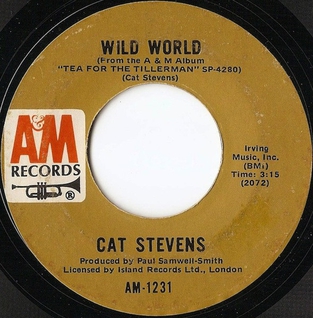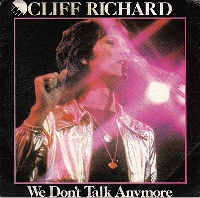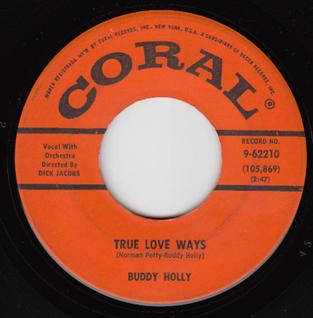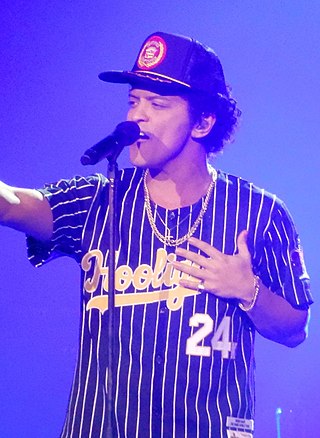"¿Quién será?" is a bolero-mambo song written by Mexican composers Luis Demetrio and Pablo Beltrán Ruiz. Beltrán recorded the song for the first time with his orchestra in 1953. Pedro Infante, for whom the song was written, recorded it in 1954.

"Another Day in Paradise" is a song written and recorded by English drummer and singer Phil Collins. Produced by Collins along with Hugh Padgham, it was released as the first single from his number-one album ...But Seriously (1989). As with his song for Genesis, "Man on the Corner", the track has as its subject the problem of homelessness and paradise; as such, the song was a substantial departure from the dance-pop music of his previous album, No Jacket Required (1985).

"Kyrie" is a song by American pop rock band Mr. Mister, from their album Welcome to the Real World. Released around Christmas in 1985, it hit the top spot on the Billboard Hot 100 in March 1986, where it was number 1 for two weeks. It also hit the top spot on the Billboard Top Rock Tracks chart for one week. In the UK, the song peaked at number 11 in March 1986.

"Wild World" is a song written and recorded by English singer-songwriter Cat Stevens. It first appeared on his fourth album, Tea for the Tillerman, recorded and released in 1970.

"Ghostbusters" is a song written by Ray Parker Jr. as the theme to the film of the same name, and included on the film's soundtrack. Debuting at number 68 on June 16, 1984, the song peaked at No. 1 on the Billboard Hot 100 on August 11, staying there for three weeks, and at No. 2 on the UK Singles Chart on September 16, staying there for three weeks. The song reentered the UK Top 75 on November 2, 2008 at No. 49 and again on November 5, 2021, at No. 38.

"I Can See Clearly Now" is a song written and recorded by American singer-songwriter Johnny Nash. It was the lead single from his album, I Can See Clearly Now (1972), and achieved success in the United States and the United Kingdom when it was released in 1972, reaching number one on the US Billboard Hot 100 and Cash Box charts. It also reached number one in Canada and South Africa. The song has been covered by many artists throughout the years, including a hit version by Lee Towers that reached no. 19 in the Dutch Top 40 in 1982, and another recorded by Jimmy Cliff for the motion picture soundtrack of Cool Runnings that peaked at no. 18 on the US Billboard Hot 100 in 1993.

"We Don't Talk Anymore" is a song recorded by Cliff Richard that reached number one in the UK Singles Chart in August 1979, remaining there for four weeks. Produced by the Shadows' rhythm guitarist, Bruce Welch, and written by Alan Tarney, it was Richard's tenth UK number one and his first since "Congratulations" in 1968.

"Living Doll" is a song written by Lionel Bart made popular by Cliff Richard and the Shadows in 1959. It was the top selling single in the UK in 1959. It has topped the UK charts twice: in its original version in 1959 and a new version recorded in 1986 in aid of Comic Relief. It is one of the few songs released by an English singer to chart on the American Billboard charts before the British Invasion occurred.

"Congratulations" is a song recorded by British singer Cliff Richard. The song was written by Bill Martin and Phil Coulter. It is best known as the British entry at the Eurovision Song Contest 1968, held in London finishing in second place behind the Spanish entry. The song went on to reach number 1 in many countries including Spain.

"True Love Ways" is a song attributed to Norman Petty and Buddy Holly. Buddy Holly's original was recorded with the Dick Jacobs Orchestra in October 1958, four months before the singer's death. It was first released on the posthumous album The Buddy Holly Story, Vol. 2, in March 1960. The song was first released as a single in Britain in May 1960, reaching number 25 on the UK Singles Chart. It was released the following month in the US, but did not make the charts. In 1988, a UK re-release of the recording by MCA, the single reached no. 65 on the UK singles chart in a 5 week chart run.

"The Millennium Prayer" is a song recorded by English singer Cliff Richard, in which the words of the Lord's Prayer are set to the tune of "Auld Lang Syne". It was released in November 1999 as a charity single in the lead-up to the new millennium, hence the name. The single became a surprise hit reaching number one in the UK Singles Chart, number two in Australia and New Zealand, number three in Ireland, and the top 20 in a number of European countries.

"Power to All Our Friends" is a song by Cliff Richard which was chosen as the British entry to the Eurovision Song Contest 1973, by a postal vote which was decided by BBC viewers after Richard performed six contending songs on A Song For Europe, featured on Cilla Black's BBC1 Saturday evening show Cilla. The runner-up song was "Come Back Billie Jo", written by Mitch Murray and Tony Macaulay, which was included as the B-side on the single. "Power to All Our Friends" came third in the Eurovision Song Contest.

"Some People" is a song by English singer Cliff Richard, released in August 1987 as the second single from his 1987 studio album, Always Guaranteed. The song reached number three on the UK Singles Chart and was certified silver by the British Phonographic Industry (BPI) for shipments over 250,000. The song reached the top 10 in several other countries as well.

American singer-songwriter Bruno Mars has released three studio albums, one collaborative studio album, one EP, 32 singles and four promotional singles. With estimated sales of over 26 million albums and 200 million singles worldwide, Mars is one of the best-selling artists of all time. Six of his singles are among the best-selling singles of all time: in order of release date, "Just the Way You Are", "Grenade", "The Lazy Song", "When I Was Your Man", "Uptown Funk" and "That's What I Like". According to the Recording Industry Association of America (RIAA), he has sold 91.5 million copies in the United States. His first two albums have sold 5.04 million copies in the US alone. In 2012, Mars was named 2011's best selling music artist worldwide. In 2022, he became the first artist to receive six diamond certified songs in the United States.
"Daddy's Home" is a famous song by American doo-wop group Shep and the Limelites. The song was written by the three members of the band, James "Shep" Sheppard (1935–1970), Clarence Bassett (1936–2005) and Charles Baskerville. The group recorded the original version of "Daddy's Home" on February 1, 1961, and it was released on Hull Records in March 1961 with the B-side being "This I Know".
"L'Edera" is an Italian language song, written by Saverio Seracini and Vincenzo D'Acquisto. The song premiered at the 8th Sanremo Music Festival in January 1958, being performed first by Nilla Pizzi and then Tonina Torrielli, with separate performances, and placing second in the competition, behind "Nel blu dipinto di blu" by Domenico Modugno and Johnny Dorelli. "L'Edera" was later recorded by several Italian artists, including Claudio Villa.

"Wired for Sound" is a song recorded by English singer Cliff Richard, released in 1981 as the lead single for his album of the same name. The song reached number 4 in the UK Singles Chart and was certified silver by the BPI for sales over 250,000. The song reached number 2 in Australia and South Africa, and was a hit in a number of European countries. The song was written by Alan Tarney and B.A. Robertson.

"Dreamin'" is a song recorded by Cliff Richard from his 1980 album, I'm No Hero. The track was the first of three singles released and was the biggest hit from the album, becoming a top-ten hit in numerous countries including the UK and the US where it became his third and last top ten hit.

"A Little in Love" is a song recorded by Cliff Richard, released as the second single from his 1980 album, I'm No Hero.

The singles discography of English singer Cliff Richard consists in excess of 200 singles, of which 159 singles have been released in the UK in varying vinyl, CD, cassette and digital formats. Listed alongside the UK singles in the discography below are a further 20 singles which were released in other territories, as well as 22 singles which were sung in German and only released in German-speaking countries.

















